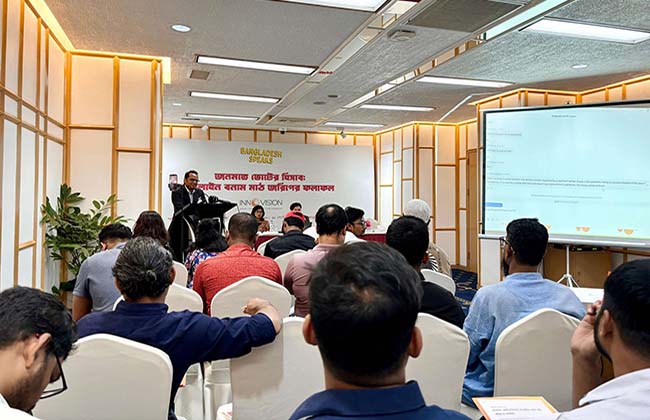
A nationwide field survey revealed that nearly 34 percent of the population remained undecided about whom they would vote for if elections were held today.
Of those surveyed face to face , 11 percent expressed their intention to vote for student-led political party if it was formed.
In contrast, an online survey conducted simultaneously showed that 35 percent of participants favoured a propective student-led political party, while 11 percent remained undecided.
Both surveys indicated a significant decline in support for mainstream political parties, particularly in online survey, where a distinct trend rejecting established political establishments emerged. It showed that around 45 percent of the aggregate survey respondents will not cast votes for any of the mainstream political parties.
The survey was conducted by Innovision Consulting Ltd., a Bangladesh-based international research and project management company having offices in UK and Nigeria as well.
Rubaiyat Sarwar, Managing Director of the company, revealed the findings of the survey at a press conference at Pan Pacific Sonargaon Hotel on Tuesday.
Sarwar said the field survey involved 5,115 respondents from across 50 districts, while the online survey involved 3,581 participants from 64 districts.
Data were collected digitally in the bangladeshspeaks.com website for online survey and a digital survey software was used for face-to-face survey between August 29 and September 8, 2024.
Rubaiyat said there were key differences between online and field survey participants. The field survey includes poor and low-income groups, with women’s participation proportionate to the population. Field surveys also capture Gen-X, Boomers, and older generations, while 92 percent of online respondents are Gen-Z and Millennials.
He said it appeared that most Gen-Z and Millennials preferred to vote for a student-supported new party, while one-third of the poor and low-income groups, who are not active online, remain undecided.
“Our survey suggests that before the next general election, mainstream political parties must increase public engagement and implement extensive programs to regain the people’s trust, he noted.
A joint review of both online and field surveys showed that age, gender, occupation, and regional sampling are crucial for a clear understanding of public opinion.
“We believe the data from both online and field surveys will aid the interim government, media, political parties, and the public in reforming Bangladesh’s state and political systems,” he added.
